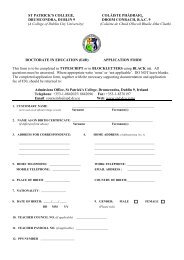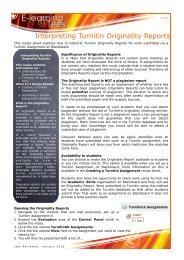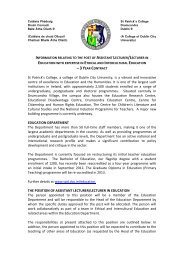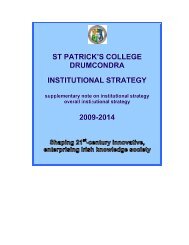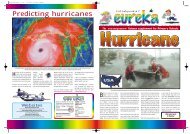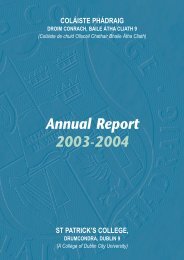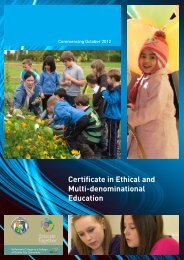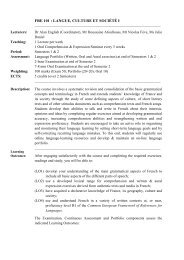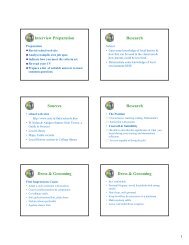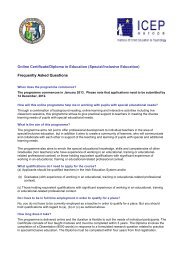BA Degree In Humanities 2011-2012 - St. Patrick's College - DCU
BA Degree In Humanities 2011-2012 - St. Patrick's College - DCU
BA Degree In Humanities 2011-2012 - St. Patrick's College - DCU
You also want an ePaper? Increase the reach of your titles
YUMPU automatically turns print PDFs into web optimized ePapers that Google loves.
Coláiste Phádraig<br />
Droim Conrach<br />
Baile Átha Cliath 9<br />
<strong>St</strong> Patrick’s <strong>College</strong><br />
Drumcondra, Dublin 9<br />
<strong>BA</strong> <strong>Degree</strong> <strong>In</strong> <strong>Humanities</strong><br />
<strong>BA</strong> sa Léann Daonna<br />
<strong>2011</strong>-<strong>2012</strong><br />
Is coláiste de chuid Ollscoil Chathair Bhaile Átha Cliath é Coláiste Phádraig
COLÁISTE PHÁDRAIG, DROIM CONRACH, <strong>BA</strong>ILE ÁTHA CLIATH 9, ÉIRE<br />
(COLÁISTE DE CHUID OLLSCOIL CHATHAIR BHAILE ÁTHA CLIATH)<br />
<strong>BA</strong> SA LÉANN DAONNA<br />
<strong>BA</strong> DEGREE IN HUMANITIES<br />
<strong>2011</strong>/<strong>2012</strong><br />
ST PATRICK’S COLLEGE, DRUMCONDRA, DUBLIN 9, IRELAND<br />
(A COLLEGE OF DUBLIN CITY UNIVERSITY)
2 De réir comhaontú nua nascála institiúide (1993, Athbhreithnithe 2008), tá<br />
Coláiste Phádraig ainmnithe mar Choláiste de chuid Ollscoil Chathair Bhaile Átha<br />
Cliath agus tá mic léinn an Choláiste ina mic léinn de chuid na hOllscoile. Mic léinn<br />
a dhéanann cúrsaí de chuid an Choláiste atá leagtha síos a chríochnú go sásúil,<br />
bronnann an Ollscoil céimeanna, dioplómaí agus teastais orthu de réir na gcúrsaí<br />
sin.<br />
<strong>In</strong> accordance with an institutional linkage agreement (1993, Revised 2008),<br />
<strong>St</strong> <strong>Patrick's</strong> <strong>College</strong> is designated a <strong>College</strong> of Dublin City University and students<br />
of the <strong>College</strong> are students of the University. <strong>St</strong>udents who satisfactorily complete<br />
prescribed <strong>College</strong> courses are conferred with appropriate degrees, diplomas and<br />
certificates by the University.
Contents<br />
3<br />
<strong>In</strong>troduction 4<br />
<strong>Degree</strong> <strong>St</strong>ructure 7<br />
Minimum Entry Requirements 8<br />
Method of Application 11<br />
HEAR route for school-leavers 12<br />
Deferred Entry 13<br />
Subject Choice 14<br />
Bioscience 15<br />
English 16<br />
French 19<br />
Gaeilge 21<br />
Geography 24<br />
History 27<br />
Human Development 29<br />
Mathematics 31<br />
Music 32<br />
Religious <strong>St</strong>udies 33
<strong>BA</strong><br />
<strong>Degree</strong> in <strong>Humanities</strong> /sa Léann Daonna<br />
4<br />
PD103 AN CHÉIM <strong>BA</strong> SA LÉANN DAONNA<br />
Cuireann an chéim <strong>BA</strong> sa Léann Daonna roimpi caoi a sholáthar do mhic<br />
léinn eolas agus tuiscint dhomhain mharthanach a fháil ar réimsí acadúla<br />
éagsúla. Leagfar béim i ngach ábhar faoi leith ar shealbhú na scileanna agus<br />
an eolais ar dlúthchuid den disciplín sin iad. Beifear ag súil go ndéanfaidh<br />
na mic léinn léitheoireacht fhairsing, ghéarchúiseach agus thuisceanach ar a<br />
gcuid ábhar; agus go léireoidh agus go nochtfaidh siad toradh a gcuid<br />
machnaimh de réir nós an léinn lena bhfuil siad ag plé.<br />
Tá mar chuspóir ag an gcéim deis a thabhairt do mhic léinn fás mar dhaoine<br />
idir mheabhair agus phearsantacht, agus cur ar a gcumas dearcadh oscailte<br />
ar an saol a chothú a rachaidh chun leasa dóibh ina gcuid oibre. Cuideoidh<br />
an taithí intleachtúil, shóisialta agus aeistéitiúl a sholáthraíonn an chéim le<br />
mic léinn iad féin a chur in oiriúint do chora difriúla an tsaoil. Cothófar<br />
muinín astu féin iontu agus beidh siad ábalta ar iad féin a chur in iúl go soléir<br />
is go daingean agus iad ag freagairt do riachtanais an tsaoil chlaochlóidigh.<br />
I gcaitheamh na dtrí bliana dóibh ag gabháil don chúrsa sa Léann Daonna<br />
beidh caoi ag mic léinn dul i ngleic le hábhair a thabharfaidh idir shásamh<br />
acadúil agus shásamh pearsanta dóibh. Tá sé i gceist go n-éascódh an<br />
teagmháil leanúnach phearsanta idir an fhoireann agus na mic léinn gnó seo<br />
na foghlama mar eachtra phearsanta.<br />
Cuideoidh an chéim le mic léinn chun tabhairt faoi chúraimí agus dhualgaisí<br />
éagsúla i réimsí na cumarsáide, na bainistíochta agus an oideachais.<br />
Cabhróidh sé leo chun tabhairt faoi chúrsaí cultúrtha, sóisialta agus sibhialta<br />
ar bhonn samhailteach fiontrach.<br />
PD 103 <strong>BA</strong> DEGREE IN HUMANITIES<br />
The degree of <strong>BA</strong> in <strong>Humanities</strong> is intended to provide students with an<br />
opportunity to gain a deep and abiding knowledge and understanding of<br />
different academic disciplines. <strong>In</strong> each subject area the main emphasis will<br />
be on acquisition of the knowledge and skills which are intrinsic to that<br />
discipline. <strong>St</strong>udents will be expected to read widely, critically and perceptively;<br />
and to reflect on their reading and articulate their responses in accordance<br />
with the tradition of discourse within a discipline.<br />
The degree aims to provide students with an opportunity to develop<br />
intellectually and personally and to gain a flexible view of life which is an<br />
important preparation for the world of work. The intellectual, social and
<strong>BA</strong><br />
<strong>Degree</strong> in <strong>Humanities</strong> /sa Léann Daonna<br />
aesthetic experience which the degree provides will enable students to adapt<br />
readily to different contexts. They will be confident and articulate persons<br />
who are responsive to the needs of a changing world. Throughout the threeyear<br />
programme in humanities, students will be given an opportunity to<br />
pursue a variety of courses which will provide academic and personal<br />
satisfaction. Regular contact between staff and students is intended to facilitate<br />
learning as a personal venture.<br />
The degree enables students to undertake a variety of tasks and<br />
responsibilities in areas such as communication, education and management.<br />
It also provides an excellent basis for enterprising and imaginative endeavour<br />
in the spheres of cultural, social and civic activity.<br />
5<br />
<strong>BA</strong> INTERNATIONAL DEGREE<br />
<strong>St</strong>udents may apply to study abroad for a full year following the completion<br />
of their second year on the <strong>BA</strong> in <strong>Humanities</strong> programme. During the<br />
international year in a partner institution abroad students take courses<br />
approved by their departments in <strong>St</strong> Patrick’s <strong>College</strong>. On returning to<br />
<strong>College</strong> for their fourth year they take the final year courses in the <strong>BA</strong><br />
programme and on successful completion are awarded the degree of <strong>BA</strong><br />
(<strong>In</strong>ternational).<br />
The <strong>BA</strong> (<strong>In</strong>ternational) degree gives students the opportunity to enrich their<br />
education by undertaking part of their course abroad. <strong>St</strong>udents who have<br />
participated in the past in this programme have found their international<br />
year to be educationally, culturally and socially fulfilling. Career<br />
opportunities both at home and abroad can be enhanced by the academic<br />
and personal experience gained.<br />
Opportunities exist also for students to spend one semester studying abroad<br />
as part of the three-year <strong>BA</strong> programme.<br />
Partner institutions<br />
Europe: <strong>St</strong> Patrick’s <strong>College</strong> has links with colleges in Austria, Belgium,<br />
Bulgaria, Czech Republic, Finland, France, Hungary, Lithuania, Northern<br />
Ireland, Norway, Poland, Scotland, Spain, Sweden and Switzerland. For<br />
students going to a college in Europe that has an Erasmus University<br />
Charter, they receive an Erasmus grant to cover a significant amount of<br />
expenses.
<strong>BA</strong><br />
<strong>Degree</strong> in <strong>Humanities</strong> /sa Léann Daonna<br />
USA: <strong>College</strong> linkages include Boston - Merrimack <strong>College</strong>, Colorado -<br />
University of Northern Colorado, California - Chico <strong>College</strong>, and the<br />
University of Mississippi.<br />
Japan: Our main link here is at Baiko Gakuin University.<br />
6<br />
<strong>In</strong>formation and application details are available from the <strong>College</strong><br />
<strong>In</strong>ternational Affairs Office:<br />
www.spd.dcu.ie/international<br />
Coordinator: Dr Gerry O’Reilly<br />
Administrator: Ms Bernie Donnelly<br />
Email: <strong>In</strong>ternationalaffairs@spd.dcu.ie<br />
Phone: + 353 1 8842214 Fax: + 353 1 8376197
<strong>BA</strong><br />
<strong>Degree</strong> in <strong>Humanities</strong> /sa Léann Daonna<br />
<strong>BA</strong> IN HUMANITIES DEGREE COURSE<br />
<strong>Degree</strong> <strong>St</strong>ructure<br />
The <strong>BA</strong> in <strong>Humanities</strong> is a three-year Honours <strong>Degree</strong> Level 8 programme. The<br />
structure of the course is 3, 2, 2, i.e. students take three subjects in first year,<br />
two in second year and two in third year.<br />
First Year<br />
<strong>St</strong>udents select three subjects from the following: Bioscience (first year only),<br />
English, French, Gaeilge, Geography, History, Human Development,<br />
Mathematics, Music, Religious <strong>St</strong>udies.<br />
7<br />
Second and Third Year<br />
<strong>St</strong>udents select two of the subjects taken in First Year.<br />
Subject Combinations and Options<br />
Some constraints on subject combinations are necessary owing to timetabling.<br />
The availability of any subject or option within it will depend on a minimum<br />
enrolment.<br />
A maximum enrolment will apply to some options within subjects.<br />
Not all optional courses within subjects will be offered each year.<br />
Subject choice is illustrated on page 14.<br />
ECTS Credit System<br />
ECTS credits reflect the workload a typical student needs to complete in order<br />
to achieve the expected learning outcomes in a programme, subject or<br />
module. This workload includes lectures, seminars, workshops, laboratory<br />
sessions, fieldwork, private study, examinations and other assessments. A fulltime<br />
academic year of study normally equates to a rating of 60 credits.<br />
Each of the three subjects in first year is allocated 20 credits, while in second<br />
and third years each subject is assigned 30 credits.
<strong>BA</strong><br />
<strong>Degree</strong> in <strong>Humanities</strong> /sa Léann Daonna<br />
Assessment<br />
Written and, where appropriate, oral examinations are held at the end of each<br />
semester/year. A proportion of marks, not exceeding 50% in any subject, may be<br />
assigned for written/practical/tutorial work during the course.<br />
8<br />
Minimum Entry Requirements - Leaving Certificate<br />
• Grade C3 in two Higher Level subjects and Grade D3 in four Ordinary, or<br />
Higher Level subjects (which must include Mathematics and either English or<br />
Irish).<br />
• The <strong>College</strong> does not award points for the subject of Mathematics at<br />
Foundation Level or at Ordinary Alternative Level. This subject will be<br />
accepted for matriculation purposes.<br />
Minimum Entry Requirements<br />
General Certificate in Education<br />
(United Kingdom and Overseas)<br />
<strong>In</strong> order to meet the general entry requirements students must meet one of the<br />
following:<br />
• 2 x Grade C at GCE A Level plus 4 x Grade C at GCSE Level which<br />
must include the subjects Mathematics and English (or Irish)<br />
• 2 x Grade C at GCE A Level plus 2 x Grade C at GCE AS Level plus<br />
2 x Grade C at GCSE Level which must include the subjects Mathematics and<br />
English (or Irish)<br />
• 2 x Grade C at GCE A Level plus 1 x Grade C at GCE AS Level plus 3 x<br />
Grade C at GCSE Level which must include the subjects Mathematics and<br />
English (or Irish)
<strong>BA</strong><br />
<strong>Degree</strong> in <strong>Humanities</strong> /sa Léann Daonna<br />
Selection Process - Leaving Certificate<br />
Applicants are placed in order of merit based on their six best subjects in one<br />
sitting of the Leaving Certificate examination, on the basis of the following points<br />
system:<br />
9<br />
From <strong>2012</strong> on a pilot basis, 25 bonus points will be added to the Leaving<br />
Certificate Higher level Mathematics points score for grade D3 or above.<br />
Selection Process - General Certificate in Education<br />
(2006 onwards)<br />
Having satisfied the entry requirements and subject entry requirements candidates<br />
are ranked for admission on the basis of a score calculated on the basis of either:<br />
• The best four GCE A level grades from one academic year<br />
or<br />
• The best three GCE A level grades from one year plus one AS level grade in<br />
a different subject from the same or preceding year only<br />
The points that apply to each grade (from 2010) are indicated in the following<br />
table:<br />
Grade A A B C D E<br />
A Level 150 135 120 100 75 40<br />
AS Level 65 60 50 35 20
<strong>BA</strong><br />
<strong>Degree</strong> in <strong>Humanities</strong> /sa Léann Daonna<br />
Leaving Certificate Vocational Programme<br />
<strong>St</strong> <strong>Patrick's</strong> <strong>College</strong> awards points as set out below for results in Leaving Certificate<br />
Vocational Programme Link Modules, in place of a sixth Leaving Certificate<br />
subject:<br />
Distinction 70 Merit 50 Pass 30<br />
The Link Modules will not qualify as a subject for Matriculation purposes.<br />
10<br />
Mature <strong>St</strong>udents<br />
Where mature students do not meet the above minimum requirements, satisfactory<br />
evidence of ability to pursue and profit from the programme will be required. This<br />
may include an applicant being called for interview. <strong>In</strong> addition to this, applicants<br />
will normally be required to take a short written test. Please note that due to the<br />
large number of applications normally received, it may be necessary to shortlist<br />
applicants on the basis of their written application.<br />
FETAC Requirements<br />
<strong>St</strong>udents with appropriate FETAC Level 5 Qualifications, with distinctions in at least<br />
five modules, may be admitted on a competitive basis to the first year of the <strong>BA</strong> in<br />
<strong>Humanities</strong> programme. Up to 5 places will normally be available.<br />
Please note that course codes and titles are subject to change in <strong>2011</strong>-12.<br />
Entry Requirements<br />
1. Full FETAC Level 5 Certificate in one of the following:<br />
ECHSX<br />
ELESX<br />
ELAXX<br />
Cultural and Heritage <strong>St</strong>udies<br />
Language and European <strong>St</strong>udies<br />
Liberal Arts<br />
2. Specific module requirements exist for ECHSX and ELESX:<br />
(See Admissions office website www.spd.dcu.ie/admissions)
<strong>BA</strong><br />
<strong>Degree</strong> in <strong>Humanities</strong> /sa Léann Daonna<br />
Points Awarded<br />
Applicants are ranked based on their performance in the 8 modules that make up<br />
their award. The score is calculated based on the grade achieved in the module<br />
and the credit value of the module, according to the following table:<br />
Credit Value<br />
of Module<br />
Distinction Merit Pass<br />
0.5<br />
1<br />
1.5<br />
3<br />
1<br />
2<br />
0.5<br />
1<br />
11<br />
The total score for all modules in the award is calculated from the above table and<br />
multiplied by a factor of 15. Where more than one student has the same score,<br />
students will be ranked by the CAO on a random basis.<br />
Scores are calculated on the basis of a single sitting only.<br />
Method of Application<br />
Applicants (other than Mature Applicants) must apply directly to the Central<br />
Applications Office (CAO). Application literature is available from CAO,<br />
Tower House, Eglington <strong>St</strong>reet, Galway.<br />
Tel. (091)-509800; Fax. (091)-562344 Web Address: www.cao.ie<br />
CAO Course Code: PD103<br />
Please note that mature students may apply either through the<br />
CAO system or through the mature students’ competition or both.<br />
Mature <strong>St</strong>udents<br />
Mature students may apply directly to the <strong>College</strong>. Mature students must be<br />
23 years of age or more on 1st January in year of entry. Application forms are<br />
available mid February <strong>2012</strong> and completed application forms should be<br />
returned by 2nd April <strong>2012</strong>.
<strong>BA</strong><br />
<strong>Degree</strong> in <strong>Humanities</strong> /sa Léann Daonna<br />
HEAR route for school leavers- Access Programme<br />
12<br />
For <strong>2012</strong> entry the <strong>College</strong> will be participating in the Higher Education<br />
Access Route (HEAR). School leavers who wish to be considered for entry on<br />
the basis of socio-economic disadvantage should apply directly to CAO<br />
online by 1 February <strong>2012</strong>, indicating on their CAO form that they wish to<br />
be considered for HEAR entry. Applicants must complete their HEAR<br />
application online form by 1 March and forward all relevant documentation<br />
required to CAO by 1 April <strong>2012</strong>.<br />
You are strongly advised to keep copies of all documents as well as proof of<br />
postage. Check the HEAR workbook and guide carefully to ensure you have<br />
entered all relevant information and ensure all pages of all supporting<br />
documents are completed correctly and sent in entirety. Applications for HEAR<br />
consideration can only be made online.<br />
Applicants who are assessed as being eligible for HEAR and who also satisfy<br />
the general minimum entry requirements are eligible to compete on a reduced<br />
points basis for a quota of places. HEAR places will be offered during round<br />
one of CAO offers and students must be available to complete an orientation<br />
programme in early September where details of further supports will be<br />
discussed. Further information on the Access Programme and HEAR is<br />
available from the Access Officer, Vivienne Byrne, Tel. (01) 884 2169, by<br />
email at Vivienne.Byrne@spd.dcu.ie or on the HEAR website<br />
www.accesscollege.ie
<strong>BA</strong><br />
<strong>Degree</strong> in <strong>Humanities</strong> /sa Léann Daonna<br />
Deferred Entry<br />
An applicant who is offered a place may defer entry for one year under certain<br />
circumstances. The following procedures apply:<br />
On receipt of offer notice from the CAO:<br />
• The applicant should not accept the offer<br />
• Write or email (admissions.office@spd.dcu.ie) immediately to the<br />
Admissions Office setting out the reason(s) for the request. Give your name<br />
as it appears on your CAO application, quote your <strong>2012</strong> CAO application<br />
number and the course code of the offer you wish to defer. Mark “Deferred<br />
Entry” clearly on the envelope or in the subject line of your email.<br />
13<br />
• The letter or email must arrive in the Admissions Office at least two days<br />
before the “Reply Date” shown on the CAO Offer Notice.<br />
• The <strong>College</strong> will communicate the decision to the applicant. If the deferral is<br />
not granted, the offer may still be accepted for the current year.<br />
<strong>In</strong> order to take up the deferred place, the applicant must reapply through the<br />
CAO by the 1st February in the succeeding year, placing the deferred course as<br />
their one and only choice on the CAO Application Form. If an applicant fails<br />
in either respect, the deferral guarantee is forfeited and an applicant enters the<br />
competition for places in the normal way.
<strong>BA</strong><br />
<strong>Degree</strong> in <strong>Humanities</strong> /sa Léann Daonna<br />
14<br />
<strong>St</strong>udent Accommodation<br />
The <strong>College</strong> has residential accommodation for approximately 230 students. <strong>In</strong>coming first<br />
year students from outside Dublin seeking on-campus accommodation can apply after<br />
receiving their CAO offer. Applications must be made online (www.spd.dcu.ie/admissions).<br />
Rooms will then be allocated by lottery and applicants will be notified as soon as possible.<br />
The <strong>St</strong>udents' Union will provide a list of off-campus accommodation in September - direct<br />
line: (01) 884 2230, www.stpatssu.com<br />
Open Day<br />
Open Day provides an opportunity to showcase the <strong>College</strong> to prospective students and their<br />
families. Our Open Day will be held in the <strong>College</strong> on Saturday November 19, <strong>2011</strong>.<br />
Details are forwarded to schools in October. <strong>St</strong>udents and parents are welcome to attend<br />
to meet current students and academic staff. For full details go to www.spd.dcu.ie/openday<br />
<strong>BA</strong> DEGREE IN HUMANITIES<br />
Subject Choice<br />
First Year<br />
<strong>St</strong>udents take three subjects from<br />
1. English<br />
2. Gaeilge<br />
3. Human Development<br />
4. History or Mathematics or Music or *Bioscience<br />
5. French or Geography or Religious <strong>St</strong>udies<br />
Second Year<br />
<strong>St</strong>udents continue with two of the subjects studied in First Year.<br />
Third Year<br />
<strong>St</strong>udents continue with the two subjects studied in Second Year.<br />
*Bioscience is First Year only
<strong>BA</strong><br />
<strong>Degree</strong> in <strong>Humanities</strong> /sa Léann Daonna<br />
BIOSCIENCE<br />
First University only<br />
The Bioscience course deals with current issues in biology, containing aspects of botany,<br />
zoology and cell biology. Practical work related to all these elements is included. Major<br />
aims of the course include the acquisition of scientific literacy, positive attitudes to<br />
science and an understanding of the place of biological science in society. As all topics<br />
start from first principles, no prior scientific knowledge is required to do well in this<br />
enjoyable and enriching study. The course itself deals with living things - their nature,<br />
diversity, functioning, interdependence, change and continuity over time. Examination<br />
is by continuous assessment, a practical examination and by a written examination.<br />
15<br />
<strong>St</strong>udents take all courses to accumulate 20 credits<br />
BIOS 101<br />
BIOS 102<br />
The Scientific / Cultural Background: Nature of Science<br />
(7.5 credits) (Semester 1 & 2)<br />
Ecology and Diversity of Life (7.5 credits)<br />
(Semester 1 & 2)<br />
BIOS 103 Cell Biology (5 credits) (Semester 1 & 2)<br />
BIOS 104 Practical Work (Semester 1 & 2)<br />
For further details, see the Department’s website:<br />
www.spd.dcu.ie/biology
<strong>BA</strong><br />
<strong>Degree</strong> in <strong>Humanities</strong> /sa Léann Daonna<br />
ENGLISH<br />
16<br />
<strong>St</strong>udents of English engage with a wide range of literature, with a particular emphasis on<br />
works by Irish, English and American writers. During the three year programme students<br />
become familiar with the characteristics and contexts of drama, poetry and fiction,<br />
studying texts from the 16th century to the present moment. <strong>In</strong> doing so, students acquire<br />
the critical tools with which to read a literary text and develop their fluency and skills in<br />
language and expression. Central to the aims of the department is the promotion and<br />
development in our students of independent critical thinking and an appreciation of the<br />
aesthetic. These aims are facilitated by lectures and small group teaching that includes<br />
weekly tutorials in all years, elective seminars in second year and Research Seminars in<br />
third year leading to the writing of a thesis. As part of the thesis writing process in third<br />
year, students work one-to-one with a supervisor from the academic staff. The department<br />
is committed to fostering creative thinking in its students and holds creative writing options<br />
in all years. Third year students have the opportunity of working with the John McGahern<br />
Writer in Residence.<br />
Assessment includes: exams; essays; projects; thesis proposal and thesis in third year.<br />
The courses listed below may be subject to change in <strong>2011</strong>-<strong>2012</strong>.<br />
First Year - 20 credits<br />
<strong>BA</strong> students take all courses<br />
First Semester<br />
ENG 101 Poetry and Possibility (2.5 credits)<br />
ENG 102 <strong>In</strong>troduction to Drama (2.5 credits)<br />
ENG 103 <strong>In</strong>troduction to Fiction: the Short <strong>St</strong>ory (2.5 credits)<br />
Second Semester<br />
ENG 104 Irish Writing Now and Then (2.5 credits)<br />
ENG 105 Research Skills and Critical Approaches (2.5 credits)<br />
ENG 106 Fiction: What’s Novel about the Novel (2.5 credits)<br />
ENG 108 Creative Writing Project (2 credits)<br />
ENG 107 Language and analysis/writing seminar (3 credits)<br />
(To be taken in both semesters)
<strong>BA</strong><br />
<strong>Degree</strong> in <strong>Humanities</strong> /sa Léann Daonna<br />
Second Year - 30 credits<br />
<strong>BA</strong> students take all courses<br />
First Semester<br />
ENG 201 Creating Childhood: Writers and Texts in the<br />
Nineteenth Century (3 credits)<br />
ENG 202 Shakespeare (3 credits)<br />
ENG 203 Radicals and Rebels in the Romantic Period (3 credits)<br />
ENG 208 English Renaissance Poetry (3 credits)<br />
ENG 209 Irish Theatre (3 credits)<br />
ENG 207 Language and analysis/writing seminar<br />
(To be taken in both semesters)<br />
17<br />
Second Semester<br />
ENG 204 Decadence and Late Nineteenth-Century Literature (3 credits)<br />
ENG 205 American Literature: American Dreams (3 credits)<br />
ENG 206 Irish Writing: Nation and Imagination (3 credits)<br />
ENG 210 Empire and Writing (3 credits)<br />
ENG 211 Special Options and Creative Writing Option (<strong>St</strong>udents choose<br />
a seminar from diverse literary topics) (3 credits)<br />
ENG 207 Language and analysis/writing seminar<br />
(To be taken in both semesters)<br />
Third Year - 30 credits<br />
<strong>BA</strong> students take all courses.<br />
First Semester<br />
ENG 301 Modern European Drama (3 credits)<br />
ENG 302 Modernisms (3 credits)<br />
ENG 303 Research Seminar: Options (3 credits)<br />
ENG 304 Children’s Literature: The Playgrounds of Childhood (3 credits)<br />
ENG 308 New Prospects in Contemporary Irish Writing (3 credits)<br />
ENG 307 Language and analysis/writing seminar<br />
(To be taken in both semesters)
<strong>BA</strong><br />
<strong>Degree</strong> in <strong>Humanities</strong> /sa Léann Daonna<br />
18<br />
Second Semester<br />
ENG 305 <strong>St</strong>aging the Transatlantic (3 credits)<br />
ENG 306 Research Seminar: Thesis (3 credits)<br />
ENG 309 American Gothic (3 credits)<br />
ENG 310 Comedy, Fantasy and Satire: 1 (Drama) (3 credits)<br />
ENG 311 Comedy, Fantasy and Satire: 2 (Prose) (3 credits)<br />
ENG 312 Creative Writing Workshop (By application. <strong>St</strong>udents accepted<br />
on to this course do not take ENG 310) (3 credits)<br />
ENG 307 Language and analysis/writing seminar<br />
(To be taken in both semesters)<br />
For further details, see the Department’s website:<br />
www.spd.dcu.ie/english
<strong>BA</strong><br />
<strong>Degree</strong> in <strong>Humanities</strong> /sa Léann Daonna<br />
FRENCH<br />
The undergraduate course provides students with a comprehensive introduction to important<br />
aspects of modern France, including its literature and culture in the context of French society<br />
as a whole. Some consideration is also given to the position of France in a wider context, in<br />
terms both of Europe and the wider Francophone world. Considerable emphasis is placed<br />
on the development of students’ capacities in the use of the French language: full use of stateof-the-art<br />
language laboratory resources combined with personal study and research, the<br />
development of a language portfolio and continuous work and practice in the written word<br />
allow for the acquisition of a high-level of competence in spoken and written French.<br />
<strong>St</strong>udents are encouraged to spend time in France by participating in one of a number of<br />
mobility programmes.<br />
19<br />
The <strong>BA</strong> programme includes an introduction to research over two years in various areas of<br />
modern French literature and leads in the final year to the production of a dissertation on a<br />
literary topic under expert supervision.<br />
The courses listed below may be subject to change in <strong>2011</strong>-12.<br />
Unless otherwise indicated, the modules below are one-semester courses<br />
First Year - 20 credits<br />
<strong>St</strong>udents take all courses.<br />
FR 101 Language and Written Expression I (2 Semesters) (6 credits)<br />
FR 102 Oral Comprehension and Expression I (2 Semesters) (4 credits)<br />
FR 103 Text, Image and Culture I (4 credits)<br />
FR 104 Text, Image and Culture II (4 credits)<br />
FR 105 Language Portfolio I (2 Semesters) (2 credits)<br />
Second Year - 30 credits<br />
<strong>St</strong>udents take all courses.<br />
FR 201 Language and Written Expression II (2 Semesters) (6 credits)<br />
FR 202 Oral Comprehension and Expression II (2 Semesters) (4 credits)<br />
FR 203 <strong>In</strong>troduction to Linguistics (3 credits)<br />
FR 204 <strong>In</strong>troduction to French Cinema (3 credits)<br />
FR 205 Classicism and Experimentation in French Theatre (3 credits)
<strong>BA</strong><br />
<strong>Degree</strong> in <strong>Humanities</strong> /sa Léann Daonna<br />
FR 206<br />
FR 207<br />
FR 208<br />
FR 209<br />
The 19th-century French Short <strong>St</strong>ory (3 credits)<br />
Texts and the Cinema of the Années noires (3 credits)<br />
<strong>BA</strong> Option course (3 credits)<br />
Language Portfolio II (2 semesters) (2 credits)<br />
20<br />
Third Year - 30 credits<br />
<strong>St</strong>udents take all courses.<br />
FR 301 Language and Written Expression III (2 semesters) (6 credits)<br />
FR 302 Oral Comprehension and Expression III (2 semesters) (5 credits)<br />
FR 303 Modernity in 19th-century French Literature & Art (2.5 credits)<br />
FR 304 Autour de Paris : images and texts of la banlieue (2.5 credits)<br />
FR 305 Research Dissertation on a Literary Topic (2 semesters) (5 credits)<br />
FR 306 Second Language Acquisition (2.5 credits)<br />
FR 307 Memory & Identity (2.5 credits)<br />
FR 308 <strong>BA</strong> Option Course (2 credits)<br />
FR 309 Language Portfolio III (2 semesters) (2 credits)<br />
For further details, see the Department's website:<br />
www.spd.dcu.ie/french
<strong>BA</strong><br />
<strong>Degree</strong> in <strong>Humanities</strong> /sa Léann Daonna<br />
GAEILGE<br />
Scrúdaítear teanga, litríocht agus cultúr na Gaeilge ina gcomhthéacsanna staire agus<br />
comhaimseartha le linn an chúrsa Nua-Ghaeilge seo.<br />
Is é aidhm an chúrsa léargas leathan a thabhairt do na mic léinn ar na príomhghnéithe den<br />
traidisiún liteartha agus béil, ar fhorbairt na seánraí, ar an nGaeilge sna meáin chumarsáide<br />
agus mar ghné den timpeallacht chultúrtha, agus ar staid shochtheangeolaíoch<br />
chomhaimseartha na teanga. Féachtar le hinniúlachtaí léitheoireachta, scríbhneoireachta,<br />
anailíse agus critice na mac léinn a fhorbairt trí théacsanna agus acmhainní foghlama<br />
ilghnéitheacha a chur faoina mbráid sna cúrsaí éagsúla léachta. Déantar na scileanna<br />
teanga – éisteacht, labhairt, léamh agus scríobh – a chleachtadh trí chúrsa comhtháite<br />
teanga a chur ar fáil sna seimineáir. Trí na príomhfhoinsí eolais agus tagartha i réimsí<br />
éagsúla de léann na Gaeilge a chur faoina mbráid agus a phlé, féachtar le cumas<br />
machnaimh agus le scileanna taighde na mac léinn a chleachtadh agus a fhorbairt ar<br />
bhealach a rachaidh chun tairbhe dóibh agus iad ag feidhmiú go gairmiúil trí mheán na<br />
Gaeilge. Tá sé mar aidhm ag an gcúrsa go mbeidh na saintuiscintí teangeolaíochta,<br />
sochtheangeolaíochta agus cultúir ag céimithe <strong>BA</strong> le Gaeilge a chuideoidh leo i réimse<br />
gairmeacha le Gaeilge, agus a bheadh mar bhonn don staidéar iarchéime san ábhar.<br />
21<br />
An Chéad Bhliain (20 creidiúint)<br />
Déanann mic léinn gach ceann de na naoi modúl. Múintear GAE 108/109 sa dá<br />
sheimeastar.<br />
Seimeastar 1<br />
GAE 101 An Béal Beo 1: An Scéalaíocht Thraidisiúnta (2.5 creidiúint)<br />
GAE 102 Meáin Chumarsáide na Gaeilge 1:<br />
An Iriseoireacht Chlóite & Chraolta (1.25 creidiúint)<br />
GAE 103 An Nualitríocht 1: An Ficsean Comhaimseartha (2.5 creidiúint)<br />
Seimeastar 2<br />
GAE 104 An Béal Beo 2: Caoineadh Airt Uí Laoghaire (2.5 creidiúint)<br />
GAE 105 Meáin Chumarsáide na Gaeilge 2: Scannáin agus Drámaí Teilifíse<br />
(1.25 creidiúint)<br />
GAE 106 An Nualitríocht 2: Saothar an Phiarsaigh (2.5 creidiúint)<br />
GAE 107 Léitheoireacht agus Láithriú: (2.5 creidiúint)<br />
GAE 108 Seimineár Teanga (Dhá uair an chloig sa tseachtain gach<br />
/109 seimeastar) (5 creidiúint)
<strong>BA</strong><br />
<strong>Degree</strong> in <strong>Humanities</strong> /sa Léann Daonna<br />
An Dara Bliain (30 creidiúint):<br />
Déanann mic léinn gach ceann de na deich modúl. Déantar GAE 211/212 sa dá<br />
sheimeastar.<br />
22<br />
Seimeastar 1<br />
GAE 201 An Nualitríocht 3: Litríocht do Pháistí (2.5 creidiúint)<br />
GAE 202 Scéalta agus Scannáin 1: Litríocht an Taistil (2.5 creidiúint)<br />
nó<br />
Saoithiúlacht na Gaeilge 1: Amhráin na Gaeilge (2.5 creidiúint)<br />
GAE 203 Foinn agus Filíocht 1: Litríocht an 17ú hAois (2.5 creidiúint)<br />
GAE 204 Seánraí na Gaeilge 1: An Fhiannaíocht (2.5 creidiúint)<br />
Seimeastar 2<br />
GAE 206 An Nualitríocht 4: An Fhilíocht Chomhaimsearatha (2.5 creidiúint)<br />
GAE 207 Scéalta agus Scannáin 2: Litríocht na hImirce (2.5 creidiúint)<br />
GAE 208 Foinn agus Filíocht 2: Filíocht agus Ceol an 18ú hAois<br />
(2.5 creidiúint)<br />
GAE 209 Seánraí na Gaeilge 2: An Dialann sa Ghaeilge (2.5 creidiúint)<br />
GAE 210 Scannáin faisnéise na Gaeilge (2.5 creidiúint)<br />
GAE 211 Seimineár Teanga (Dhá uair an chloig sa tseachtain gach<br />
/212 seimeastar) (7.5 creidiúint)<br />
An Tríú Bliain (30 creidiúint):<br />
Déanann mic léinn gach ceann de na deich modúl. Déantar GAE 312/313 sa dá<br />
sheimeastar.<br />
Seimeastar 1<br />
GAE 301 An Nualitríocht 5: An tÚrscéal Gaeilge (2.5 creidiúint)<br />
GAE 302 An Béal Beo 3: Canúintí na Gaeilge (2.5 creidiúint)<br />
GAE 303 Cúrsa Roghnach (2.5 creidiúint)<br />
GAE 304 Seánraí na Gaeilge 3: Scéal na Litríochta (2.5 creidiúint)<br />
GAE 305 Scileanna Acadúla (2.5 creidiúint)
<strong>BA</strong><br />
<strong>Degree</strong> in <strong>Humanities</strong> /sa Léann Daonna<br />
Seimeastar 2<br />
GAE 306 An Nualitríocht 6: Filí Comhaimseartha na Gaeilge agus an<br />
Traidisiún (2.5 creidiúint)<br />
nó<br />
An Nualitríocht 6: Saothar na nGriannach (2.5 creidiúint)<br />
GAE 307 An Béal Beo 4: An Béaloideas (2.5 creidiúint)<br />
GAE 308 An tSochtheangeolaíocht (2.5 creidiúint)<br />
GAE 309 Seánraí na Gaeilge 4: Scéalta Beatha na Gaeilge (2.5 creidiúint)<br />
GAE 310 An Focal Beo: Cúrsa Scríbhneoireachta (2.5 creidiúint)<br />
GAE 312 Seimineár Teanga (Uair sa tseachtain gach seimeastar)<br />
/313 (5 creidiúint)<br />
23<br />
N.B. Is féidir go dtiocfaidh athruithe áirithe ar leagan amach na gcúrsaí seo.<br />
Cuirfear athrú ar bith in iúl do mhic léinn ag an am cuí.<br />
Chun teacht ar thuilleadh eolais, féach ar shuíomh gréasáin na Roinne<br />
www.spd.dcu.ie/gaeilge
<strong>BA</strong><br />
<strong>Degree</strong> in <strong>Humanities</strong> /sa Léann Daonna<br />
GEOGRAPHY<br />
24<br />
Geography is the study of the inter-relationship between people and environments - both<br />
natural and created by people. <strong>In</strong> both narrow and wider senses Geography is all around us.<br />
It may be seen at many levels or scales of environment, from the local through to the global.<br />
Geographers concern themselves with the human and physical elements of those<br />
environments, together with their historical development, spatial organisations, interrelationships,<br />
management and planning.<br />
The nature and sequence of the course in Geography provides students with a framework that<br />
will guide them from an introductory level through to a detailed analysis of topical issues and<br />
themes.<br />
The Geography course will be taught through lectures, tutorials and practical classes and<br />
fieldwork. Emphasis is placed on the development of a variety of skills such as reading and<br />
constructing maps, preparing and carrying out fieldwork and social surveys, writing and<br />
presenting reports.<br />
First Year - 20 credits<br />
N.B. Please note that the syllabus below is that which applied in the academic year<br />
2010 –<strong>2011</strong>. Changes may be introduced to the syllabus in <strong>2011</strong>-<strong>2012</strong>. <strong>St</strong>udents will be<br />
notified of these changes at the appropriate time.<br />
<strong>St</strong>udents take all courses<br />
GEOG 101<br />
GEOG 102<br />
GEOG 103<br />
An <strong>In</strong>troduction to Human Geography (7.5 credits)<br />
An <strong>In</strong>troduction to Physical Geography (7.5 credits)<br />
Geographical Skills (5 credits)<br />
All First Year students are required to attend a one-day field trip as part of GEOG<br />
101. This fieldwork will take place before Christmas and students will be<br />
accommodated in smaller groups when going on these trips.<br />
<strong>St</strong>udents will be split into groups for the practical sessions (GEOG 103).
<strong>BA</strong><br />
<strong>Degree</strong> in <strong>Humanities</strong> /sa Léann Daonna<br />
Second Year - 30 credits<br />
N.B. Please note that the syllabus below is that which applied in the academic year<br />
2010 –<strong>2011</strong>. Changes may be introduced to the syllabus in <strong>2011</strong>-<strong>2012</strong>. <strong>St</strong>udents<br />
will be notified of these changes at the appropriate time.<br />
<strong>St</strong>udents taking Geography and Human Development take all courses.<br />
GEOG 210 forms part of their course requirements in Human Development and<br />
not Geography.<br />
25<br />
<strong>St</strong>udents taking Geography but not studying Human Development may<br />
choose between GEOG 210 and GEOG 212. However, please note that GEOG<br />
210 is a prerequisite for GEOG 311 Research Project / Dissertation.<br />
GEOG 203<br />
GEOG 208<br />
GEOG 209<br />
GEOG 210<br />
GEOG 211<br />
GEOG 212<br />
GEOG 215<br />
Geographical Research Methods (5 credits)<br />
Europe and the European Union (5 credits)<br />
The Making of the Irish Landscape (5 credits)<br />
Research Methods 2 (5 credits)<br />
Society, Space and <strong>In</strong>equality (5 credits)<br />
Landscape, Heritage and Identity (5 credits)<br />
Humanitarian Action (5 credits)<br />
All Second Year students will be required to complete a one-day field trip<br />
associated with one of the courses taught during Semester 2.<br />
Third Year - 30 credits<br />
N.B. Please note that the syllabus below is that which applied in the academic year<br />
2010 –<strong>2011</strong>. Changes may be introduced to the syllabus in <strong>2011</strong>-<strong>2012</strong>. <strong>St</strong>udents<br />
will be notified of these changes at the appropriate time.<br />
<strong>BA</strong> students choose six of the following courses, and may only choose a maximum<br />
of two of the final three courses (308, 310 and 311).<br />
GEOG 303<br />
GEOG 305<br />
GEOG 306<br />
GEOG 309<br />
Mediterranean, Middle East and North Africa (5 credits)<br />
Contemporary Geographical Issues (5 credits)<br />
Slums and Suburbs (5 credits)<br />
Historical Geography (5 credits)
<strong>BA</strong><br />
<strong>Degree</strong> in <strong>Humanities</strong> /sa Léann Daonna<br />
GEOG 314<br />
GEOG 308<br />
GEOG 310<br />
GEOG 311<br />
Children’s Geographies (5 credits)<br />
Isle of Man Field Course (5 credits)<br />
Water Resources (5 credits)<br />
Research Project / Dissertation (5 credits)<br />
26<br />
For further details, see the Department's website:<br />
www.spd.dcu.ie/geography
<strong>BA</strong><br />
<strong>Degree</strong> in <strong>Humanities</strong> /sa Léann Daonna<br />
HISTORY<br />
This subject aims to give students a familiarity with the major events in History, and to<br />
develop their understanding of the significant issues and trends in the shaping of the<br />
modern world. <strong>In</strong> the process it seeks to enhance students' critical thinking and<br />
expression and to develop their ability to interpret evidence.<br />
The History Department offers a wide variety of courses. The emphasis is primarily on<br />
modern Irish, British, European and American history. Most courses are designed to<br />
contain a balance of topics from political, social and economic history. Courses are<br />
taught through lectures, tutorials and seminars. <strong>In</strong> the tutorial system, students meet<br />
weekly in small groups to discuss issues arising from lectures and written work. They<br />
acquire practice in organising and expressing their arguments, both verbally and in<br />
writing. <strong>In</strong> second and third years, students will also present and discuss papers at<br />
seminars. Prospective students should note that it is not necessary to have studied<br />
history previously.<br />
27<br />
Detailed course descriptions, reading lists etc. are contained in History Course books<br />
presented to students at the beginning of each year.<br />
First Year<br />
<strong>St</strong>udents take an <strong>In</strong>troductory Module and HIST 101, HIST 102 and Hist 103 to<br />
accumulate 20 credits<br />
<strong>In</strong>troductory Module An <strong>In</strong>troduction to History<br />
HIST 101 From <strong>St</strong>one Age to New Age: the history of the Irish<br />
Landscape (7.5 credits)<br />
HIST 102 Early Modern Europe, 1500-1715 (5 credits)<br />
HIST 103 The World since 1945 (7.5 credits)<br />
Second Year<br />
<strong>St</strong>udents take HIST 201, HIST 202 and two other second-year courses<br />
to accumulate 30 credits<br />
HIST 201 Ireland: from Williamite Conquest to the Great Famine,<br />
1690 -1850 ( 7.5 credits)<br />
HIST 202 Europe in the Era of Enlightenment and Revolution,<br />
c.1740 –c.1830 (7.5 credits))<br />
HIST 203 America: From Colony to Nation (7.5 credits)
<strong>BA</strong><br />
<strong>Degree</strong> in <strong>Humanities</strong> /sa Léann Daonna<br />
HIST 204 Early Medieval Ireland 431 - 1169: history and society<br />
(7.5 credits)<br />
HIST 205 <strong>In</strong>troduction to the Atlantic Slave Trade (7.5 credits)<br />
HIST 206 Russia: Reform, Reaction and Revolution 1801 -1929<br />
(7.5 credits)<br />
28<br />
Third Year<br />
<strong>St</strong>udents take HIST 301, HIST 302, a special documents course and one<br />
other third-year course to accumulate a total of 30 credits<br />
HIST 301<br />
HIST 302<br />
HIST 303<br />
Modern Ireland 1850 - 1970 (7.5 credits)<br />
Europe 1848 - 1950: Reaction and Reform<br />
(7.5 credits)<br />
Ireland and Irish America 1700 - 2001 (7.5 credits)<br />
HIST 304 America from Civil War to Superpower, 1840 - 1972<br />
( 7.5 credits)<br />
HIST 305 Radicalism in Twentieth Century Ireland:<br />
A Documentary History (Documents Course) (7.5 credits)<br />
HIST 306 1798: Revolution or Rebellion<br />
(Documents Course) (7.5 credits)<br />
HIST 307 Women and Society in Ireland 1800 - 1922<br />
(Documents course) (7.5 credits)<br />
HIST 308 Revolution and Civil War: Ireland 1913 -1923<br />
(Documents course) 7.5 credits)<br />
HIST 309 Medieval Archaeology (Documents course)<br />
(7.5 credits)<br />
Please note that not all course options may be on offer in <strong>2011</strong>-12<br />
For further details, see the Department's website:<br />
www.spd.dcu.ie/history
<strong>BA</strong><br />
<strong>Degree</strong> in <strong>Humanities</strong> /sa Léann Daonna<br />
HUMAN DEVELOPMENT<br />
Human Development is a study of the human person developing through the life span.<br />
It is an interdisciplinary subject that introduces students to Psychology, Sociology and<br />
Philosophy. From the complementary perspectives of these disciplines, it aims to help<br />
students towards an informed and critical understanding of human needs and<br />
capacities at crucial stages of the developmental process.<br />
First year courses focus on childhood, adolescence is the central theme of second year,<br />
while crucial issues of adulthood are addressed in the third year. <strong>St</strong>udents are presented<br />
with authoritative and recent findings in these areas and familiarised with a range of<br />
research methods. At the same time, the historical context of inquiry about the human<br />
person is emphasised and students are sensitised to conflicting value orientations often<br />
involved in discussion of controversial issues concerning human behaviour.<br />
29<br />
Through a combination of lectures, seminars and assignments, students are encouraged<br />
to develop their powers of interpretation, analysis and judgement. This development is<br />
promoted through focused reading in established disciplines of inquiry. But given the<br />
focus of the whole course on the human person in society, it is intended as an ultimate<br />
aim of Human Development that students would develop both in their selfunderstanding<br />
and in their understanding of others.<br />
These were the courses for 2010/11. Changes may be made for <strong>2011</strong>/12.<br />
All courses carry five credits<br />
First Year - 20 credits<br />
HD 101<br />
HD 102<br />
HD 103<br />
HD 104<br />
Social, Emotional and Moral Development of the Child<br />
(5 credits)<br />
<strong>In</strong>tellectual Development of the Child (5 credits)<br />
Social Contexts of Childhood (5 credits)<br />
Historical and Philosophical Perspectives on Childhood<br />
(5 credits)<br />
Second Year - 30 credits<br />
HD 201<br />
HD 202<br />
HD 203<br />
Psychology l: Learning and Motivation (5 credits)<br />
Psychology ll: Adolescence (5 credits)<br />
Social Contexts of Adolescence (5 credits)
<strong>BA</strong><br />
<strong>Degree</strong> in <strong>Humanities</strong> /sa Léann Daonna<br />
HD 204 Philosophies of the Imagination (5 credits)<br />
HD 205 <strong>In</strong>troduction to Existentialism (5 credits)<br />
HD 206 Research Methods (5 credits)<br />
Third Year - 30 credits<br />
30<br />
HD 301 Adult Development (5 credits)<br />
HD 302 Psychopathology (5 credits)<br />
HD 303 Counselling and Psychotherapy (5 credits)<br />
HD 304 The Person as Ethical Agent (5 credits)<br />
HD 305 Social Contexts of Adulthood (5 credits)<br />
HD 306 Research Project (5 credits)<br />
For further details, see the Department’s website<br />
www.spd.dcu.ie/chd
<strong>BA</strong><br />
<strong>Degree</strong> in <strong>Humanities</strong> /sa Léann Daonna<br />
MATHEMATICS<br />
The course in Mathematics is intended to furnish the student with a firm foundation in<br />
the core areas of Algebra and Analysis. This foundation strives to provide a balance<br />
between fundamental theory and applications. Other topics such as Number Theory<br />
and <strong>St</strong>atistics enhance students’ appreciation of the ideas as well as some of the<br />
applications of Mathematics in contemporary society. Extensive use is made of<br />
mathematical software such as Maple and GeoGebra, while Excel is used in the<br />
<strong>St</strong>atistics course.<br />
31<br />
N.B. Changes may be introduced to the syllabus in <strong>2011</strong>-<strong>2012</strong>. <strong>St</strong>udents will be<br />
notified of these changes at the appropriate time.<br />
First Year<br />
<strong>St</strong>udents take all three modules to accumulate 20 credits.<br />
MATH 101 Calculus (9 credits)<br />
MATH 102 Finite Mathematics and Linear Algebra (9 credits)<br />
MATH 108 Technology for Mathematics (2 credits)<br />
Second Year<br />
<strong>St</strong>udents take all four modules to accumulate 30 credits.<br />
MATH 201 Analysis of one real variable (7.5 credits)<br />
MATH 202 Linear Algebra (7.5 credits)<br />
MATH 203 Number Theory (7.5 credits)<br />
MATH 204 History of Mathematics (7.5 credits)<br />
Third Year<br />
<strong>St</strong>udents take all four modules to accumulate 30 credits.<br />
MATH 301 Calculus of Several Variables (7.5 credits)<br />
MATH 302 Abstract Algebra ( 7.5 credits)<br />
MATH 304 History of Mathematics (7.5 credits)<br />
MATH 306 <strong>St</strong>atistics (7.5 credits)<br />
For further details, see the Department’s website:<br />
www.spd.dcu.ie/mathematics
<strong>BA</strong><br />
<strong>Degree</strong> in <strong>Humanities</strong> /sa Léann Daonna<br />
MUSIC<br />
32<br />
The Music course is designed to enable students to develop their musicality, and to<br />
deepen their understanding of music. This is achieved in a number of ways. First,<br />
students develop their knowledge and understanding of classical, traditional, popular<br />
and other music styles, drawing on a range of analytical and critical approaches.<br />
Second, students engage systematically with the practice and development of skills and<br />
techniques in music writing/composition, music listening and music technology. Third,<br />
they partake in ongoing studies in individual performance and participate in musical<br />
groups. <strong>St</strong>udents also engage with modules that explore music in contexts of human<br />
experience and culture. All modules are carried out over two semesters. The course is<br />
examined by a combination of written examinations and coursework. Examinations<br />
comprise written papers and an end-of-year practical examination on an individual<br />
instrument or on voice. Coursework includes essays, technical assignments, reviews and<br />
group presentations. A research project or extended essay is carried out in third year.<br />
First Year<br />
<strong>St</strong>udents take all courses (20 credits)<br />
MUS 101 Musical Techniques I (10 credits)<br />
MUS 102 Topics in Musicology I (5 credits)<br />
MUS 103 Performance/Participation in Musical Activities I (5 credits)<br />
Second Year 1<br />
<strong>St</strong>udents take all courses (30 credits)<br />
MUS 201 Musical Techniques II (12.5 credits)<br />
MUS 202 Topics in Musicology II (10 credits)<br />
MUS 203 Performance/Participation in Musical Activities II (5 credits)<br />
MUS 204 Music, Human Experience and Culture I (2.5 credit)<br />
Third Year 2<br />
<strong>St</strong>udents take all courses (30 credits)<br />
MUS 301 Musical Techniques III (10 credits))<br />
MUS 302 Topics in Musicology III (10 credits)<br />
MUS 303 Performance/Participation in Musical Activities III (5 credits)<br />
MUS 304 Music, Human Experience and Culture II /Final Year Project<br />
(5 credits)<br />
1<br />
From September <strong>2012</strong><br />
2<br />
From September 2013<br />
For further details, see the Department's website<br />
www.spd.dcu.ie/music
<strong>BA</strong><br />
<strong>Degree</strong> in <strong>Humanities</strong> /sa Léann Daonna<br />
RELIGIOUS STUDIES<br />
Religious <strong>St</strong>udies is concerned with the universal phenomenon of religion. <strong>St</strong>udents will<br />
critique Christian theology and study major world religions in the context of modern<br />
culture. Christianity will be reflected upon and examined in the spirit of ecumenism and<br />
inter-religious dialogue through a variety of disciplines such as theology, philosophy,<br />
history, sociology and psychology. Discourse in respectful and learned dialogue is<br />
integral to the programme. Please note that previous study of religion is not a<br />
requirement.<br />
33<br />
First Year - 20 credits<br />
<strong>St</strong>udents take all modules. Single semester modules comprise two lectures<br />
weekly; year-long modules comprise one lecture weekly.<br />
RS101 Christian Foundations (5 credits)<br />
A survey course of the Bible and the Early Church with a<br />
concentration on the person and mission of Jesus Christ.<br />
RS102 The Synoptic Gospels (5 credits)<br />
An introduction to New Testament studies and an<br />
examination of the three gospels of Matthew, Mark and Luke.<br />
RS103 History of Christianity (5 credits)<br />
An introduction to the History of Christianity.<br />
RS104 Abrahamic Faiths: Judaism / Islam (5 credits)<br />
A study of these major world faiths, their principal religious<br />
ideas, personalities, development, history, and relations with<br />
Christianity.<br />
Second Year - 30 credits<br />
<strong>St</strong>udents take all modules. Single semester modules comprise two lectures<br />
weekly; year-long modules have one lecture weekly.<br />
RS201 Creed and Trinity (5 credits)<br />
The principal teachings of Christianity, especially the Trinity, and<br />
their formulation in the Christian Creed.<br />
RS202 Pentateuch and Prophets (5 credits)<br />
An introduction to the Hebrew scriptures, through a study of the<br />
first five books of the Bible and the Jewish prophetic tradition.<br />
RS203 Eastern Religions: Hinduism / Buddhism (5 credits)<br />
An introduction to Hinduism and Buddhism with reference to the<br />
spiritual, cultural and religious dimensions of these <strong>In</strong>dic World<br />
Religions.
<strong>BA</strong><br />
<strong>Degree</strong> in <strong>Humanities</strong> /sa Léann Daonna<br />
34<br />
RS204<br />
RS205<br />
RS206<br />
Religion and Philosophy (5 credits)<br />
Various approaches taken by human thought in respect<br />
of religion.<br />
Religion and Experience (5 credits)<br />
An exploration of the religious dimension of human experience.<br />
Celtic Spirituality (5 credits)<br />
The course introduces students to Celtic Spirituality. Three eras will<br />
be examined: Celtic Past, Christian Origins and contemporary<br />
spiritualities.<br />
Third Year - 30 credits<br />
<strong>St</strong>udents take six modules including an extended essay. Single semester<br />
modules comprise two lectures weekly; year-long modules comprise one<br />
lecture weekly.<br />
RS301<br />
Moral Theology (5 credits)<br />
The basis for Christian moral judgment and decisions, and<br />
contemporary issues that call for Christian moral discernment<br />
RS302A The Writings of John (2.5 credits)<br />
A study of the gospel of John<br />
RS302B The Writings of Paul (2.5 credits)<br />
A study of the letters of Paul<br />
RS303 The Sacred and Worship (5 credits)<br />
An introduction to ritual and liturgy in a variety of<br />
religious traditions<br />
RS304 Feminist/Women-Defined Theologies (5 credits)<br />
This introductory module invites students to explore women’s<br />
experience as an important starting point for theological reflection.<br />
Feminist theology is presented as an assembly of ecumenical,<br />
interreligious, multicultural and global voices advocating women’s<br />
rights in society and church.<br />
RS306 Extended Essay (5 credits)<br />
(8,000 Words)<br />
<strong>St</strong>udents Choose RS305A or RS305B or RS305C<br />
RS305A Religion and Science (5 credits)<br />
An exploration and critique of the religion and science<br />
relationship: Religious issues and scientific discoveries.
<strong>BA</strong><br />
<strong>Degree</strong> in <strong>Humanities</strong> /sa Léann Daonna<br />
RS305B Religion and Psychology (5 credits)<br />
A survey of what eminent psychologists have to say about the<br />
phenomenon of religion and human experience<br />
RS305C Religion and Social Justice (5 credits)<br />
The module surveys Catholic Social Teaching relating to national<br />
and global issues of justice including, for example, application to<br />
the Peter McVerry trust and Focus Ireland<br />
For further details, see the Department’s website:<br />
www.spd.dcu.ie/religious_studies<br />
35
<strong>BA</strong><br />
<strong>Degree</strong> in <strong>Humanities</strong> /sa Léann Daonna<br />
Tá an t-eolas sa leabhrán seo ann mar threoir d'iarrthóirí ar ionaid i<br />
gColáiste Phádraig agus ní féidir glacadh leis mar chonradh idir an Coláiste<br />
agus iarrthóir nó an tríú duine ar bith.<br />
Tharlódh go ndéanfaí athruithe ar chúrsaí ó am go ham agus ba chóir do<br />
mhic léinn an t-eolas a cheistiú má bhíonn amhras orthu.<br />
36<br />
Tuilleadh eolais le fáil ó láithreán gréasáin an Choláiste www.spd.dcu.ie nó<br />
ón Oifig Iontrála, Coláiste Phádraig, Baile Átha Cliath 9.<br />
Fón 01 884 2013 / 01 884 2025 / 01 884 2096.<br />
The information in this booklet is intended as a guide to persons seeking<br />
admission to <strong>St</strong> <strong>Patrick's</strong> <strong>College</strong> and shall not be deemed to form a contract<br />
between the <strong>College</strong> and an applicant or any third party.<br />
Courses are subject to change from time to time and students should enquire<br />
as to the up-to-date situation at any appropriate time.<br />
Further information available from the <strong>College</strong> website www.spd.dcu.ie or the<br />
Admissions Office, <strong>St</strong> <strong>Patrick's</strong> <strong>College</strong>, Dublin 9.<br />
Phone 01 884 2013 / 01 884 2025 / 01 884 2096.
Tel: +353 1 884 2000 (Main Reception)<br />
Tel: +353 1 884 2096 / 2025 / 2013 (Admissions)<br />
Fax: +353 1 837 6197<br />
Email: admissions.office@spd.dcu.ie<br />
Website: www.spd.dcu.ie<br />
Designed & Printed by O’Donoghue Print





